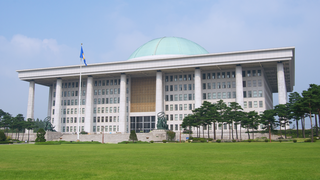
Citizenship in North Korea is a status given to individuals recognized as North Korean by the government of the country. It is a source of shared national identity, but can also be one of contention or conflict.

Citizenship in North Korea is a status given to individuals recognized as North Korean by the government of the country. It is a source of shared national identity, but can also be one of contention or conflict.
North Korea adopted a nationality law in 1963, 15 years after being founded on 9 September 1948. [1] It has since been revised in 1995 and 1999. The nationality law of the Democratic People's Republic of Korea (DPRK) governs who is a citizen of the DPRK, and how one may gain or lose such citizenship. It prescribes citizenship qualifications, citizen rights, and citizen protections. While containing just 16 articles, it covers most of the basic features which can be found across modern citizenship legislation in other nations. [2] Furthermore, North Korean nationality law incorporates anyone who resided in the country since the foundation of the DPRK. This includes varied groups due to the DPRK's annexation by Japan and the United States, occupation by the Soviet Union and final surrender to the Allies in 1945. The law assumes that people registered in North Korea became nationals of North Korea.
Source: [3]
Jus sanguinis , or the "right of blood," means determining citizenship through the status of a child's parents. Any child born to two North Korean nationals becomes a North Korean citizen. However, if a child is born abroad to one North Korean national and one parent of a different nationality, the citizenship is to be determined by the parents.
Jus soli , or the "right of the soil," is better known as birthright citizenship. This type of citizenship or nationality is awarded to citizens who are born within the jurisdiction of a given state. In North Korea, birth within the country's borders does not automatically grant a child citizenship, with the exception of a child born in North Korea with "unknown or stateless parents."[ citation needed ]
The process of naturalization involves formal proceedings for acquiring citizenship of a country. It is not guaranteed and can involve a wide variety of stipulations. In North Korea, the status of naturalization is unclear. It can only be granted by the Presidium of the Supreme People's Assembly, and further specific requirements are unknown.
The government of North Korea does not recognise dual nationality except if such a person defected to North Korea and travel is not possible. However, North Korean citizens who flee to South Korea automatically become South Korean citizens regardless of their own will as the North Korean government is not recognised by South Korean authorities based on the Article 3 of the Constitution of South Korea which states that "Republic of Korea has the Korean peninsula and its dependent islands as its territory". [4] They are not allowed to return to North Korea without special permission and approval from the South Korean government.

Naturalization is the legal act or process by which a non-citizen of a country may acquire citizenship or nationality of that country. It may be done automatically by a statute, i.e., without any effort on the part of the individual, or it may involve an application or a motion and approval by legal authorities. The rules of naturalization vary from country to country but typically include a promise to obey and uphold that country's laws and taking and subscribing to an oath of allegiance, and may specify other requirements such as a minimum legal residency and adequate knowledge of the national dominant language or culture. To counter multiple citizenship, some countries require that applicants for naturalization renounce any other citizenship that they currently hold, but whether this renunciation actually causes loss of original citizenship, as seen by the host country and by the original country, will depend on the laws of the countries involved.

Jus soli, commonly referred to as birthright citizenship, is the right to acquire nationality or citizenship by being born within the territory of a state.
Jus sanguinis is a principle of nationality law by which citizenship is determined or acquired by the nationality or ethnicity of one or both parents. Children at birth may be citizens of a particular state if either or both of their parents have citizenship of that state. It may also apply to national identities of ethnic, cultural, or other origins. Citizenship can also apply to children whose parents belong to a diaspora and were not themselves citizens of the state conferring citizenship. This principle contrasts with jus soli, which is solely based on the place of birth.
United States v. Wong Kim Ark, 169 U.S. 649 (1898), was a landmark decision of the U.S. Supreme Court which held that "a child born in the United States, of parents of Chinese descent, who, at the time of his birth, are subjects of the Emperor of China, but have a permanent domicile and residence in the United States, and are there carrying on business, and are not employed in any diplomatic or official capacity under the Emperor of China", automatically became a U.S. citizen at birth. This decision established an important precedent in its interpretation of the Citizenship Clause of the Fourteenth Amendment to the Constitution.
In international law, a stateless person is someone who is "not considered as a national by any state under the operation of its law". Some stateless people are also refugees. However, not all refugees are stateless, and many people who are stateless have never crossed an international border. On November 12, 2018, the United Nations High Commissioner for Refugees stated there are about 12 million stateless people in the world.
Nationality law is the law of a sovereign state, and of each of its jurisdictions, that defines the legal manner in which a national identity is acquired and how it may be lost. In international law, the legal means to acquire nationality and formal membership in a nation are separated from the relationship between a national and the nation, known as citizenship. Some nations domestically use the terms interchangeably, though by the 20th century, nationality had commonly come to mean the status of belonging to a particular nation with no regard to the type of governance which established a relationship between the nation and its people. In law, nationality describes the relationship of a national to the state under international law and citizenship describes the relationship of a citizen within the state under domestic statutes. Different regulatory agencies monitor legal compliance for nationality and citizenship. A person in a country of which he or she is not a national is generally regarded by that country as a foreigner or alien. A person who has no recognised nationality to any jurisdiction is regarded as stateless.

Liberian nationality law is regulated by the Constitution of Liberia, as amended; the Aliens and Nationality Law, and its revisions; and various international agreements to which the country is a signatory. These laws determine who is, or is eligible to be, a national of Liberia. The legal means to acquire nationality, formal legal membership in a nation, differ from the domestic relationship of rights and obligations between a national and the nation, known as citizenship. Nationality describes the relationship of an individual to the state under international law, whereas citizenship is the domestic relationship of an individual within the nation. Liberian nationality is based on descent from a person who is "Negro", regardless of whether they were born on Liberian soil, jus soli, or abroad to Liberian parents, jus sanguinis. The Negro clause was inserted from the founding of the colony as a refuge for free people of color, and later former slaves, to prevent economically powerful communities from obtaining political power. It can be granted to persons with an affiliation to the country, or to a permanent resident who has lived in the country for a given period of time through naturalization.

Italian nationality law is the law of Italy governing the acquisition, transmission and loss of Italian citizenship. Like many continental European countries it is largely based on jus sanguinis. It also incorporates many elements that are seen as favourable to the Italian diaspora. The Italian Parliament's 1992 update of Italian nationality law is Law no. 91, and came into force on 15 August 1992. Presidential decrees and ministerial directives, including several issued by the Ministry of the Interior, instruct the civil service how to apply Italy's citizenship-related laws.

South Korean nationality law details the conditions in which an individual is a national of the Republic of Korea (ROK), commonly known as South Korea. Foreign nationals may naturalize after living in the country for at least five years and showing proficiency in the Korean language. All male citizens between the ages of 18 and 35 are required to perform at least 18 months of compulsory military service. North Korean citizens are also considered South Korean nationals, due to the ROK's continuing claims over areas controlled by the Democratic People's Republic of Korea (DPRK).

French nationality law is historically based on the principles of jus soli and jus sanguinis, according to Ernest Renan's definition, in opposition to the German definition of nationality, jus sanguinis, formalised by Johann Gottlieb Fichte.

Portuguese nationality law details the conditions by which a person is a national of Portugal. The primary law governing nationality regulations is the Nationality Act, which came into force on 3 October 1981.

Slovenian nationality law is based primarily on the principles of jus sanguinis, in that descent from a Slovenian parent is the primary basis for acquisition of Slovenian citizenship. However, although children born to foreign parents in Slovenia do not acquire Slovenian citizenship on the basis of birthplace, place of birth is relevant for determining whether the child of Slovenian parents acquires citizenship.

Japanese Nationality Law details the conditions by which a person holds nationality of Japan. The primary law governing nationality regulations is the 1950 Nationality Act.

Nationality law of Greece is based on the principle of jus sanguinis. Greek citizenship may be acquired by descent or through naturalization. Greek law permits dual citizenship. A Greek national is a citizen of the European Union, and therefore entitled to the same rights as other EU citizens.

The Romanian nationality law addresses specific rights, duties, privileges, and benefits between Romania and the individual. Romanian nationality law is based on jus sanguinis. Current citizenship policy in Romania is in accordance with the Romanian Citizenship Law, which was adopted by the Romanian Parliament on March 6, 1991, and the Constitution of Romania, which was adopted on November 21, 1991.
The nationality law of Bangladesh governs the issues of citizenship and nationality of the People's Republic of Bangladesh. The law regulates the nationality and citizenship status of all people who live in Bangladesh as well as all people who are of Bangladeshi descent. It allows the children of expatriates, foreigners as well as residents in Bangladesh to examine their citizenship status and if necessary, apply for and obtain citizenship of Bangladesh.

North Korean nationality law details the conditions in which an individual is a national of the Democratic People's Republic of Korea (DPRK), commonly known as North Korea.
Multiple/dual citizenship is a person's legal status in which the person is at the one time recognized by more than one country under its nationality and citizenship law as a national or citizen of that country. There is no international convention which determines the nationality or citizenship status of a person, which is consequently determined exclusively under national laws, that often conflict with each other, thus allowing for multiple citizenship situations to arise.

Albanian nationality law is based on a mixture of the principles of Jus sanguinis and Jus soli. In other words, both place of birth and Albanian parentage are relevant for determining whether a person is an Albanian citizen. It is regulated by the "Law on Albanian Citizenship". In some circumstances citizenship is granted to children born in Albania to non-Albanian parents. This is not the case where parents are temporary or short-term visitors. As suggested by the United Nations and Council of Europe, all efforts are made in order to avoid statelessness.

Citizenship of South Korea is granted to qualifying individuals under the South Korean Nationality Act and its fifteen amendments. Citizenship status reflects the rights, duties, and identity of individuals in relation to the South Korean state.